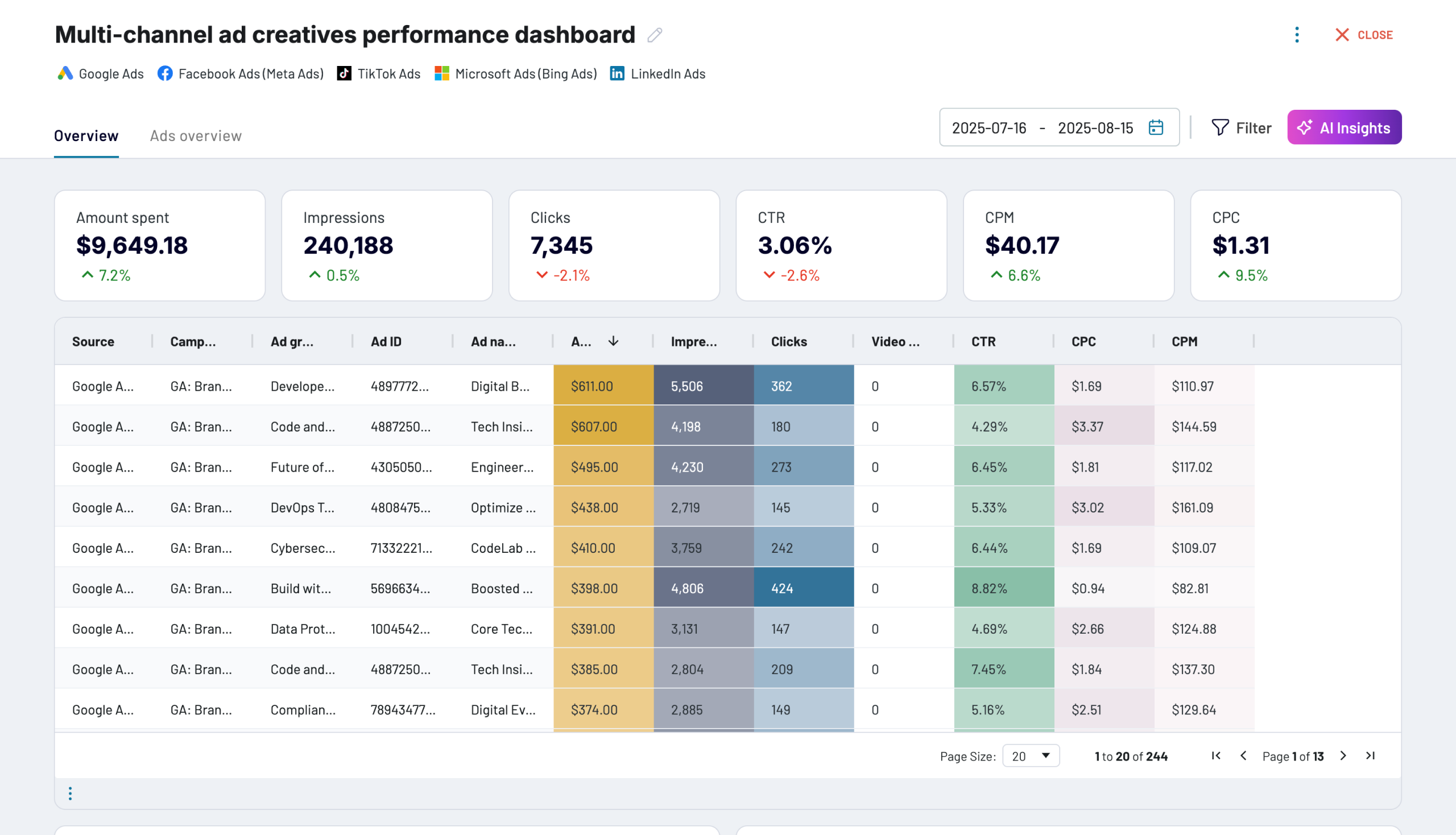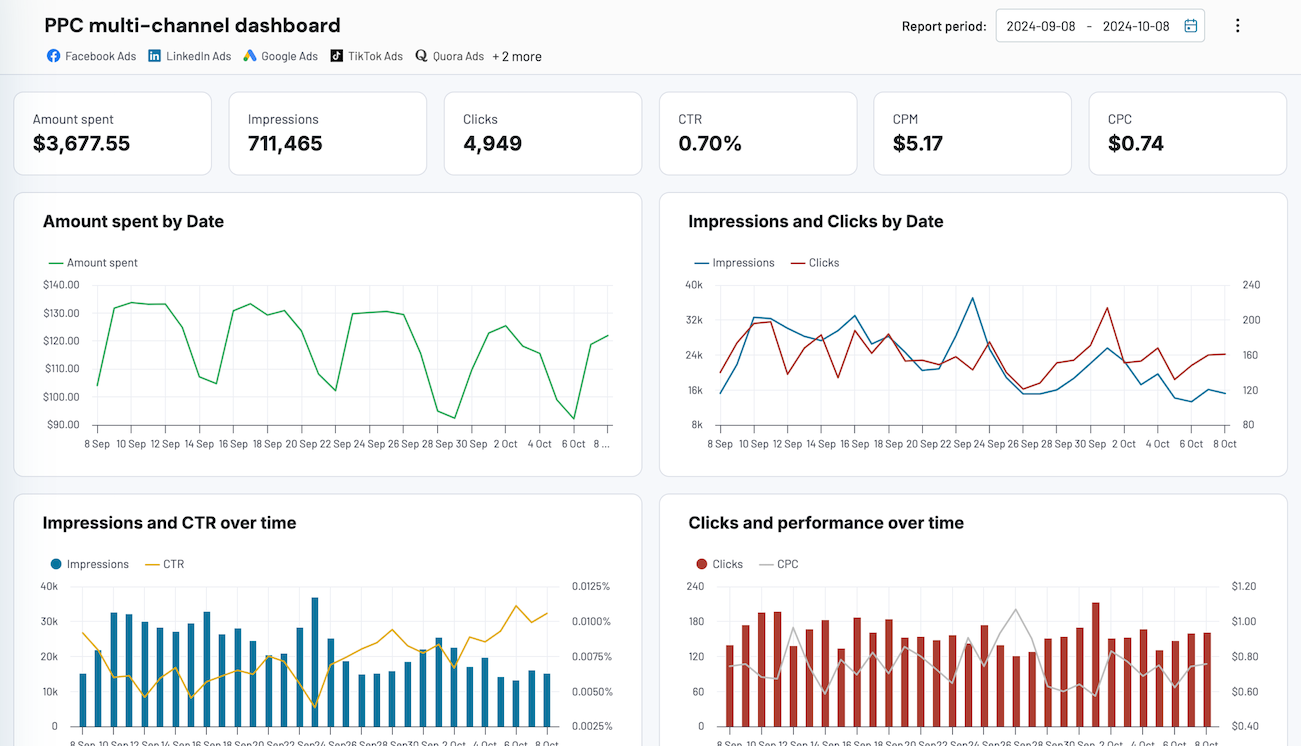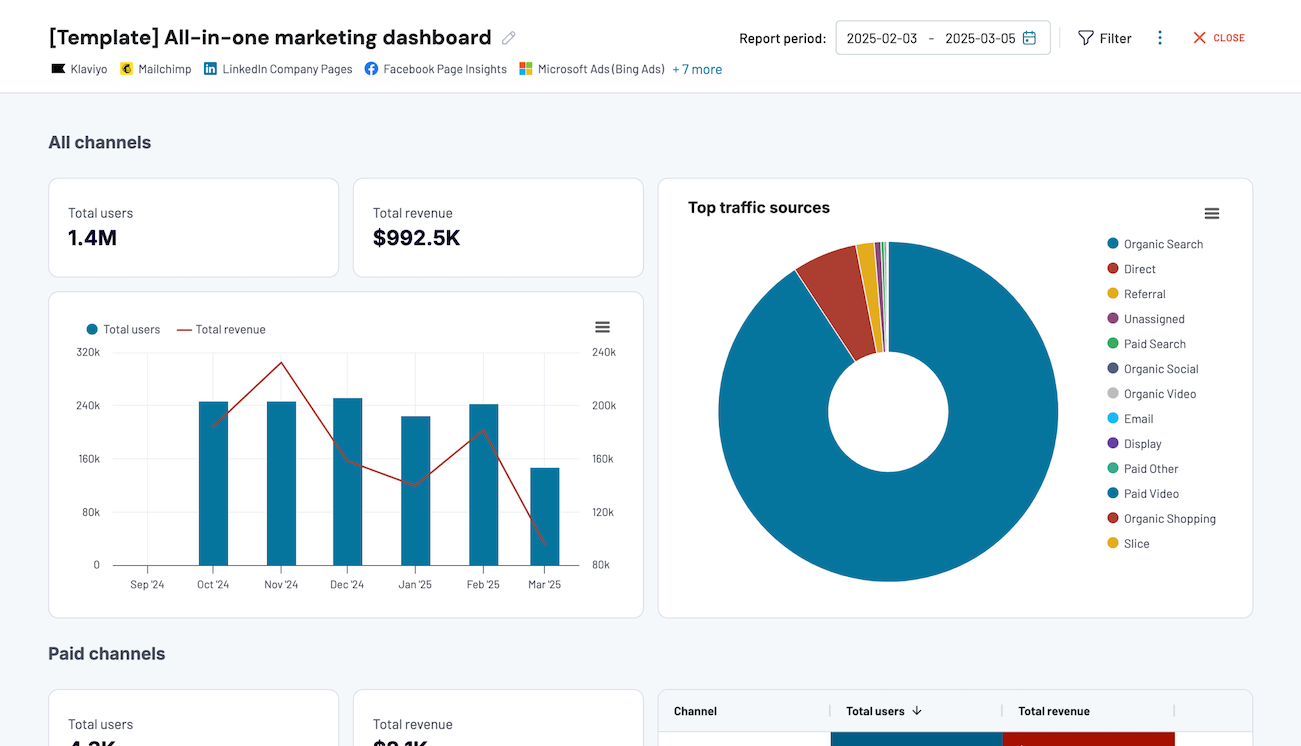Connect Google Sheets to JSON with Coupler.io to simplify reporting
Get and prepare data effortlessly
Take advantage of Coupler.io’s pre-built connectors and user-friendly interface to export Google Sheets to JSON. Optimize your workflow by collecting and transforming data with no coding. Join data from multiple sources and prepare it for analysis.
Automate reporting tasks
Coupler.io eliminates the need to enter data manually for your reports. Instead, you can schedule automatic data exports from Google Sheets to JSON. Create comprehensive cross-app reports or use ready-to-use dashboard templates for quick insights.
Stand out as a data-driven expert
Use Coupler.io to create concise and accurate reports that provide near real-time insights. Present your findings to clients and stakeholders by highlighting the key points. Decide how to spend the saved time on other tasks of high importance.
How to connect Google Sheets to JSON (detailed guide)
Export Google Sheets to JSON format using no-code Coupler.io. Simplify your data collection, organization, and management to automate workflows and increase productivity. See how to integrate Google Sheets to JSON with a clear step-by-step instruction provided below.
Step 1: Collect data
Begin the setup by creating the importer and configuring the source parameters. Connect your Google Sheets account, select the file from the disk storage, and pick up the workbook sheet. You can also specify a range of cells to import data from or leave the field empty to export all the data from the selected sheet.

Step 2: Organize and transform
At this stage, Coupler.io provides you with a preview of the data selected during the previous step. Have a look at it and decide whether any modification is needed on the data.
Coupler.io offers a range of options for elaborating on data before loading it into a JSON file:

Step 3: Load and schedule refresh
As your data is organized, you can start loading it into a JSON file. In the Destination tab, click Generate Link and copy the integration URL. Use this link to connect Google Sheets to JSON for your specific use case.

To keep your JSON file up-to-date, set up a schedule for automatic data refresh.
Step 1: Collect data
Begin the setup by creating the importer and configuring the source parameters. Connect your Google Sheets account, select the file from the disk storage, and pick up the workbook sheet. You can also specify a range of cells to import data from or leave the field empty to export all the data from the selected sheet.

Step 2: Organize and transform
At this stage, Coupler.io provides you with a preview of the data selected during the previous step. Have a look at it and decide whether any modification is needed on the data.
Coupler.io offers a range of options for elaborating on data before loading it into a JSON file:
- Filter and sort records based on specific parameters.
- Hide columns that aren’t necessary for export.
- Rename, edit, and rearrange columns.
- Add new columns to create metrics using formulas applied to the existing data.
- Append data from different sources.

Step 3: Load and schedule refresh
As your data is organized, you can start loading it into a JSON file. In the Destination tab, click Generate Link and copy the integration URL. Use this link to connect Google Sheets to JSON for your specific use case.

To keep your JSON file up-to-date, set up a schedule for automatic data refresh.
Export Google Sheets to JSON on a schedule
Automating data export from Google Sheets to JSON supplies your reports with the most recent data. Schedule automatic data refreshes with Coupler.io to drive timely insights. You can set the update interval from 15 minutes to one month, depending on your preferences. Specify the exact days of the week, time preferences, and time zones if needed. That way, Coupler.io grants full control over your data refreshment and eliminates the need for manual updates. As a result, you have more time at your disposal and confidence that your JSON data is accurate and ready for analysis.


Export data from Google Sheets to alternative destinations
Quick start with dashboard templates

Multi-channel ad creatives performance dashboard







PPC multi-channel dashboard











All-in-one marketing dashboard













No such template is available yet.
No worries. Our team will create a template that fits your needs, just tell us more
about your case. It doesn't cost you a penny 😉
Request a custom report
about your case. It doesn't cost you a penny 😉
Export Google Sheets to JSON automatically with just a few clicks.
Connect similar Files & Tables apps and get data in minutes
What to export from Google Sheets to JSON
Marketing Data
Send marketing data stored in Google Sheets to JSON. Analyze campaign performance and optimize strategies based on the obtained insights. Use these findings to explore your target audience and adjust your marketing efforts for better results.
Sales Data
Connect Google Sheets to JSON to assess the performance of the sales team. Analyze sales data for revenue tracking and sales trends monitoring. This helps you to identify best-selling products and customer preferences. You will also discover the areas for improvement in the sales processes.
Finance Data
This data represents the company’s cash flow and expense tracking. Analyzing financial data helps you understand the company's financial health. Based on the obtained results, you can make informed decisions and plan future investments.
Accounting Data
Invoices and expenses are key accounting data showing incoming and outgoing financial operations. Export Google Sheets to JSON to ensure accurate auditing and reporting. Get transparency in your financial operations and improve your financial planning.
SEO Data
This data contains information on keyword rankings, website performance, and key traffic sources. Analyze SEO data to derive ideas on content strategy and search rankings optimization. Take a chance to increase organic traffic, thereby improving online visibility.
E-commerce Data
This data includes customer purchase behavior, product performance, and inventory levels. By analyzing it, you can discover patterns in customer purchasing habits. This information can help you optimize product listings and personalize customer experiences.
PPC Data
This comprises the following metrics: click-through rates, conversion rates, and cost-per-click. Export Google Sheets data to JSON and analyze the effectiveness of your paid advertising campaigns. Use the obtained insights to optimize ad spending and maximize advertising efforts.
Social Media Data
Likes, shares, and comments across platforms make up social media data. Its analysis helps businesses understand audience reactions and measure the impact of social campaigns. It also helps to improve brand presence and engagement.
How do you connect Google Sheets to JSON?
Step 1. Connect your Google Sheets account and choose the spreadsheet and a sheet or sheets to export data from
Step 2. Organize and transform data before loading it into JSON
Step 3. Generate a JSON URL where your data will be loaded
Step 4. Schedule auto-refreshes to export Google Sheets to JSON at desired intervals
Pricing plans
- Monthly
- Annual (save 25%)
Keep your data safe
Coupler.io safeguards your shared information and data transfers from breaches, leaks, and unauthorized disclosures.






















